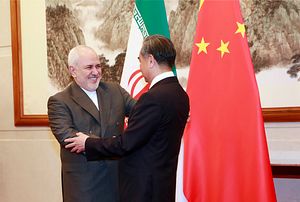Of the world’s powers that have a stake in managing the aftermath of the Saudi oil attacks, China is best positioned to de-escalate tensions between Riyadh and Tehran.
China and Saudi Arabia’s oil-based bilateral trade has increased from $1 billion in 1990 to more than $70 billion by 2013. Saudi Arabia and China are natural trade partners — in 2017, China surpassed the United States to become the world’s largest oil importer.
China buys lots of oil, but hesitates to get involved in security issues in the Gulf. The United States has called on China to share the costs of security and has accused Beijing of free-riding. China views the Middle East as a political quagmire in which involvement would certainly cost Chinese treasure and might even cost Chinese blood. Beijing prefers to benefit from U.S. security guarantees in the region rather than take risks.
China’s caution was demonstrated last Monday when a representative for the Chinese foreign ministry said that China “opposes any action that may intensify events in the Middle East,” a statement that was as unhelpful as it was evasive.
As a world power with major interests in the Gulf, China must be prepared to pay the price to protect its interests and use its political capital to end the conflict.
Among world powers, China maintains equally constructive economic and political partnerships with both Saudi Arabia and Iran. The nature of Iran’s involvement in the attack remains to be determined, but it is already clear that Riyadh, Tehran, Washington, and Beijing do not want war. The time for diplomacy is now.
Iran trusts China to be an honest broker. Last Tuesday, China reportedly established a $400 billion credit line for trade with Iran. China’s uncritical relationship with Iran makes it an appealing partner in potential multilateral talks.
China’s diplomatic footprint in the Middle East has been increasing. It negotiated the Iran Nuclear Deal as a member of the P5+1 powers and has hosted talks between Syria’s government and opposition. The oil attacks require China to step up its game because they pose a more immediate threat to China’s interests. China no longer has the option of playing it safe.
China sees itself as a world power. This crisis gives President Xi Jinping a chance to prove that China isn’t just talk. China has the motivation, leverage, and opportunity to convene all parties in the Gulf and pull them back from the brink of war. The question is whether China has the guts and the United States has to wisdom to let them step in.
Lucille Greer is a Schwarzman Fellow at the Wilson Center.

































